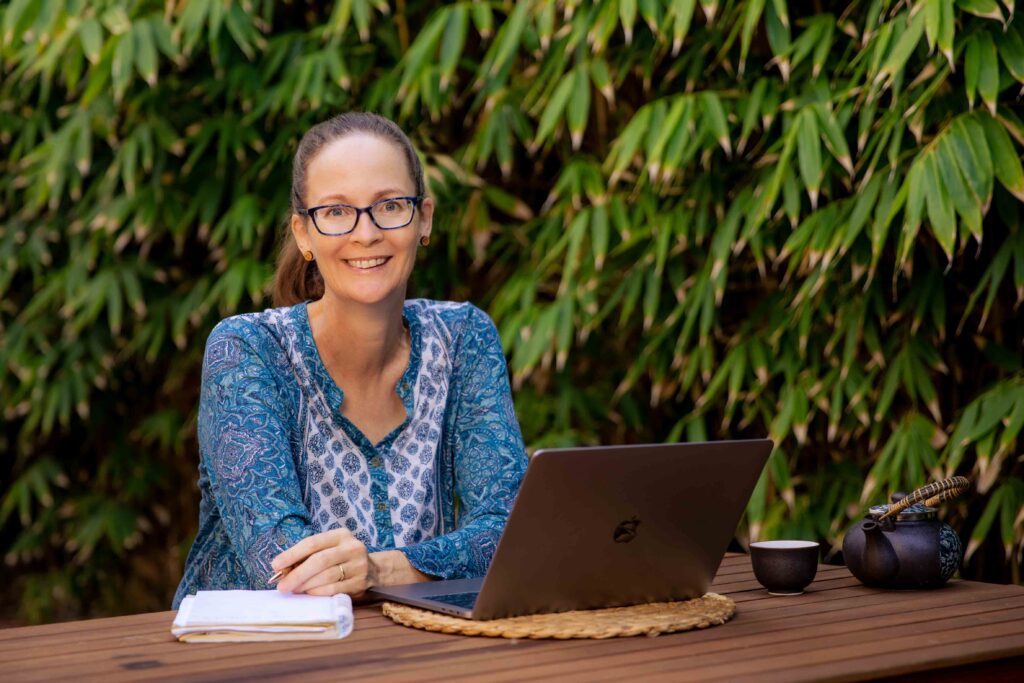Sara Howard is a writer, content marketer, and small-business owner. In this piece, she investigates what’s behind the rising tide of small-business owners moving to regional areas of Australia.
With the rising cost of living, out-of-reach city house prices, and the realisation your morning commute need only be as far as your kitchen table, it’s hardly surprising that two in five capital city residents are thinking of moving to the country.
That includes many small business owners, founders and freelancers. By mid-2023, 31 per cent of the 2.5 million Australian small businesses were located in a regional area – and of these, the vast majority are sole traders or micro-businesses.
I am one of them. Or at least, I will be – I’m currently in what my new community calls ‘the transition phase’, splitting my time between Sydney and the mid-North Coast of NSW.
COVID accelerated my family’s 10 year plan to buy a place near the beach, and the rapid shift to online meetings enables me to run my copywriting agency, Writers Australia, from anywhere.
Before 2020, I spent almost every day travelling to and from client meetings, and frequently popped down to Melbourne to cram all the relationship building I could into a sleep-shattering day. Today, I could count the number of new clients we meet in real life on one hand – whether they’re in Sydney, Melbourne, Brisbane or beyond. And they don’t mind whether I’m dialling in from Writers HQ or my Scotts Head spare room, as long as we keep doing great work.
What’s surprised me is how much easier, efficient and energised that work is away from the hectic pace and distractions of a big city. And how many other freelancers and founders have realised exactly the same thing.
Finding focus
When Amanda Deacon and Ciara Waters founded Lexicon, a communications agency based in Sydney, they pioneered a more progressive approach to flexible working. Almost ten years later, Amanda put that culture to the test when she relocated her young family to Cairns during the first pandemic lockdown.
Having never set foot in Far North Queensland, they thought it would be a short-term adventure while her husband had a contract with James Cook University.
Five years later, they have no plans to return.
“It turns out we love it here,” says Amanda. “It’s a much more relaxed pace of life, our children are outside all the time, we spend our weekends on the Great Barrier Reef, we’re camping and swimming. For me, that’s living.”
For two working parents with primary school-aged children, the work-life balance is infinitely easier. “You don’t realise how much stress you’re feeling until you leave that pressure cooker,” she says.
Amanda’s role as Lexicon’s CEO remains the same, leading the business strategy and key account direction. She flies to Sydney every six weeks or so, prioritising client presentations.
“One benefit of my move is it’s forced other team members to take a bit more responsibility for business development,” she says. “That’s a positive, as it should be everyone’s role.”
Working away from city pressures can sharpen your focus on what matters. It frees time in the day for deeper thinking. And it certainly reduces the financial stress on family life.
Over in Armidale, entrepreneurs Steph and Martin Wanless have had a similar realisation. The couple met while working with a content marketing agency in Sydney. They moved to Newcastle for more space – with a baby in tow – but initially Martin was still commuting back to Sydney a few days a week. The balance felt off.
In 2019 they shifted further north to Armidale, close to Steph’s parents. Martin focused on building a B2B content agency, By Wanless. This financial safety net enabled Steph to launch their second family business: regional magazine and website REGGIE.
“I can deliver far greater value working from a regional area,” Martin says. “If I was at a bigger agency, I’d be managing a team of 15 or more. Now, my clients get direct access to my experience – without the overheads. And I’m more relaxed, so I have the right mindset to do good work.”

Expanding opportunities
Self-employment gives you control over where you work and how much you can earn. And that income can far exceed what a regional employer could match. It’s also potentially less risky than betting a major lifestyle move on the one employer in town.
And although it seems counter-intuitive, relocating your business away from the city can actually make your world bigger.
“It creates a mindset shift: your client base doesn’t need to be so narrow,” says Amanda. She’s now exploring new business opportunities in Asia, with Singapore just a six hour flight from her home.
Over in Port Macquarie, author advocate and publishing industry dynamo Anna Featherstone has never regretted her move from Sydney. In her new home, she mentors authors, hosts a self-publishing podcast for the global Alliance of Independent Authors (ALLi), judges book awards, and runs workshops.
“It’s so easy to stay up with, if not be ahead of, fast-moving trends and industry transformation,” she says. “I’m not bound to one city, but I am embedded in an incredibly curious, creative and entrepreneurial community around Australia and the world.”

Staying connected
Distance can create a few downsides. Delayed or cancelled regional flights can make long road trips your only Plan B for urgent client meetings. The NBN isn’t always an option.
Business owner Elizabeth Bond says she relies on Starlink satellite. She runs the business Zenbird Words, which requires a reliable internet connection to host VIP days with overseas clients, and is also developing an AI-powered product. The satellite connection is crucial for her business – but it’s also relatively costly.
Then there’s the problem of staying socially connected, because moving into a small community can be isolating at first. Elizabeth emphasises the critical importance of “staying plugged in” to local networking groups and online communities.
“I love collaborating, and I’ve built many relationships with people through online groups, professional development courses, and memberships,” she says.
Wanting to expand business networking opportunities in her new home, Elizabeth became a founding member and president of the Nambucca Valley Women’s Business Network, which has opened the door to speaking opportunities.
Steph Wanless expressed a similar sentiment.
“You still need business support, or you could find yourself in an echo chamber,” says Steph. “It’s even more important to make time for face to face meetings, because in regional areas everything runs on relationships.”
She credits her Byron Bay-based business coach and a local business group with keeping her accountable. One conversation led to REGGIE shortlisting for the 2024 Innovate with NBN grant, which Steph says she would never have heard about otherwise.
Before you start planning your regional relocation, make sure your business has a strong foundation.
“I don’t think this move would have been possible if my business wasn’t already established, with a strong reputation in the market,” says Amanda. “I think it would be very hard to build something new.”
It’s also important to make sure the move makes sense for you personally. Does your family have specific medical or education needs, or do you need to be within close proximity of an airport?
“Think deeply about whether you’re ‘running away from’ or ‘running to,’” advises Anna. “Solve any business or personal problems first, so you can make the move without bringing excess baggage along.”
Having spent 18 years growing my business, I’m now able to reap its benefits. It gives me the flexibility to work where I want – knowing my team will back me 100%. And it’s given me the freedom and space to focus on writing my first book, Beyond Solo, which explores what good growth looks like beyond a company of one.
Stepping back from the grind has helped me understand what business growth means to me personally. And that can be profoundly liberating – because your business should work for you, not the other way around.











